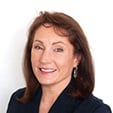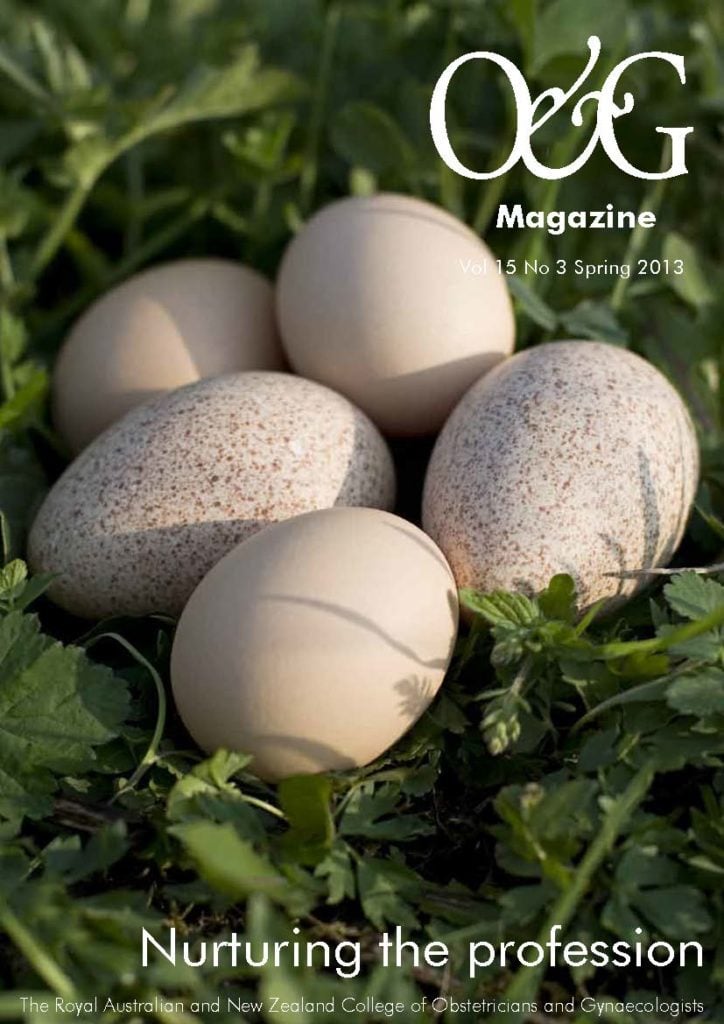A personal reflection on combining family, medicine and a satisfying professional career.
My mother wanted to be a doctor from her early years. When her father (the school headmaster) refused to let her study physics because he didn’t consider it appropriate for a girl, she took to her bed for a week and refused to get up until he gave in. She won that one, but lost later when, having been accepted into medicine, he refused to allow her to start the course. With no other means of financial support it was a decision she had to accept. She studied science and married my father (an intern) still with hopes of studying medicine, but the unreliability of spermicidal foam meant that a month later she was pregnant with me. Thoughts of ever being able to do medicine faded into the reality of Australia in the 1960s.
I, who knew from an early age that I would have my parents’ support in whatever endeavour I chose, was more ambivalent. I accepted the position offered after casually filling out an application form (no UMAT or GAMSAT in those days) and ‘not having anything better to do’. It is a decision I have never regretted. Medicine has been good to me.
Reliable contraception no longer a concern, my challenges have been those of so many women my age: how to combine career, husband, family and a need for personal challenge, in a generation where it was okay for women to ‘have it all’ as long as they ‘did it all’, and proved themselves doubly worthy of any opportunities given?
We were benefiting from a generation of women who, while not achieving their own plans, valued their daughters’ education and ambitions. However, with few female mentors and even fewer who had combined work and family successfully, it did feel as if we were making it up as we went along.
As a new graduate, unspoken positive discrimination in favour of men in hospital environments was common, but generally not intrusive, and far less than I saw in other professions such as law. As young women, we noticed the increased interest taken in the career path of our male colleagues and it matched our experience socially. Among professional couples, ‘his’ career was generally considered more important and deserving of support, while ‘hers’ was considered more an ‘optional pastime’. Not at all how we as young women graduates viewed ourselves, but just the way it was.
Life as a registrar
The selection for registrar positions was more random than it is now and heavily reliant on the professors’ preference. My interview in Hobart (after sitting my ‘First Part’) finished with the suggestion that ‘wouldn’t I just prefer a GP position?’ and a pinched bottom on the way out. Life was different then. It was with great pleasure that I accepted an offer in Adelaide.
My first year as a registrar started well, but became one of disillusionment. The consultants generally looked unhappy in their chosen profession, and I took 12 months off to reconsider my options. I returned a year later knowing that gynaecology was for me and I would drop obstetrics at my first opportunity.
As consultants, I think we sometimes forget how important our role as mentor is. Registrars value seeing someone in a role they can see themselves in. For me, my first list with Ossie Petrucco proved a turning point. The laparoscopy was inspiring and when I told him ‘I want to do what you do’, his initial surprise was followed by gracious and substantial teaching over many years, in what were the early days of operative laparoscopy.
When you realise life is different for women
Before children, being female in medicine is a small inconvenience. As professional women find everywhere, it is easy to work around gender issues while childless and imagine they don’t exist. Maybe this is why the change when you become pregnant feels so stark? The desire to work, learn and accomplish isn’t lost with delivery of the baby, but the ability to be 100 per cent available for the job is. Of course men aren’t 100 per cent available either. Who would want to be? But life changes more for women – and it’s harder to hide. As always, it is the colleagues that supported you when you were pregnant or vulnerable, who are forever remembered fondly.
In the early 1990s, even with all exams completed, a half-time training position wasn’t something you could take for granted. It is a credit to our College that half-time training was accepted in principle around that time – even if negotiating this in practice wasn’t easy.
Despite the difficulties, from a professional perspective, the three years as a half-time registrar were the making of my career. I loved my job even more when it was three days a week, arrived keen to work every day and truly believe that the hospital did well out of the arrangement. It also provided time for me to learn the skills I needed rather than those that suited the hospital rotation. Assisting private laparoscopic cases and attending workshops and meetings to improve my surgery were opportunities the full-time registrars busy on labour ward didn’t have.
On completing my Fellowship after nine years on the labour ward despite no intention of continuing obstetrics, I just wanted to operate. My aim was to be the best laparoscopic surgeon I could be, and to care for my patients to the best of my abilities.
With no offers to join a practice, two children, a working husband to consider and no public hospital employment flexibility, I set up in solo gynaecology practice. Looking back, it was a blessing in disguise, as it forced me to learn how to find rooms, run a practice efficiently, employ staff, type quickly and set up computers when I had few patients and spare time. The reality of setting up a business as a woman back then seems laughable now, but I remember being turned down for a $20 000 bank loan in the weeks after finishing my Fellowship because he considered me ‘unemployed’. There were other banks.
Keeping relevant
Many of us will work as a specialist for 30 years. So, if the adage ‘ten years is enough in any job’ is true, how do we maintain enthusiasm when the excitement of another laparoscopic hysterectomy or vaginal breech delivery fades?
For me, the desire to continue learning and positively contribute in an area of need has led to the care of women with pelvic pain. During my training, like everyone, I dreaded seeing patients with chronic pain because I felt so powerless to help them. It was the days of rapid improvement in laparoscopic surgical technique and we had the (quaint) belief that if we could just do our surgery that bit better then we could cure pain.
It was when I had my own patients and saw them over time that I started to recognise the flaws in this. Even with beautiful surgery only some got better. Many others continued to have pain or had pain that recurred within a few months. Laparoscopy certainly had a place, but the concept that we could treat chronic pain with surgery alone was outmoded at best or deeply depressing if you took the patient’s point of view. Nine years of training had not equipped me to manage pain.
Recognising that it was time for me to change, learn new skills and think more broadly has been a wonderful opportunity to remain relevant and interested.
I have been fortunate that these thoughts came at a time of dramatic change in the area of pain management, when the knowledge required to do a better job was readily available when I looked for it, and during the establishment of the Faculty of Pain Medicine with its supportive, multidisciplinary approach.
These days, seeing women and girls with chronic pain, individualising their care with or without surgery and working with other health professionals to optimise outcome is something I find truly satisfying.
What would I change about training?
It’s a long haul. Current Trainees may already have completed an undergraduate degree before starting medicine, fulfilled bonded country placement requirements, spent time in service positions and completed years of research to enhance their chances of acceptance. They then work part-time as a registrar because the need to start childbearing has become imperative. Fellowship itself might be followed by yet further subspecialist study to finally arrive at the career they may have chosen 20 years earlier!
I believe that our specialty has enlarged beyond the expertise that one individual can maintain over a professional career, particularly with the ever-increasing requirements for accreditation and continued education. As such, it is likely that many Fellows will choose to narrow their practice to specific areas of our discipline.
Initiatives that allow Trainees to focus on their chosen area of practice and the skills they will require relatively early in training are welcome. When considering where my own practice has led, an opportunity to acquire broader ‘pelvic surgeon’ skills – and increased knowledge of gastroenterology, urology, musculoskeletal medicine and pain management during my training would have been advantageous.
For women entering our profession
Our daughter is a medical student with her choice of career no longer anything unusual. When you take on a challenging life, a good work-life balance is always difficult – but this is true for men as well as women.
I believe that women have already changed, and will continue to change, medicine. Possibly by being prepared to take on areas, like pain, that have been relatively neglected in the past – or by providing an alternative viewpoint on common conditions.
So what have I learned that could possibly be of use to a Trainee in 2013?
- Choose an area of specialisation. Combining work, family and ensuring that your work remains at a high standard is easier if you narrow your focus. My decision to stop studying obstetrics once my exams were completed allowed me to concentrate on gynaecology and, particularly, laparoscopic surgery.
- Choose an area likely to change over time. Health economics may mean that our duties are increasingly taken over by other health professionals. Problem-solving abilities are always valued – and change keeps you interested and relevant.
- Take the initiative to learn new skills. Fellowship training can’t be expected to provide all the skills you’ll need in practice.Private consultants see a different range of conditions and will often welcome your request to observe at their rooms or assist in theatre. Consider attending subspecialist meetings in your area of interest.
- Learn from men. Some skills seem to come more naturally to men. I have always admired the ability to fully focus on a single task and the ability to move on from setbacks without looking back. These skills can be learned.
- Choose your partner carefully. Behind most successful women is a partner who values her intellect and ambition.
- You don’t need to do it all. As another gynaecologist told me: ‘Once you have children expect to spend half your income on keeping home running smoothly.’ Not just childcare, but optimally someone who will manage the everyday tasks and allow you unhurried time with your partner and children.
Where is my mother now?
After ten years at home raising children, my mother taught biochemistry to medical students, worked as a child welfare officer, helped found Tasmania’s Domestic Violence Action Group and worked as National Secretary of the Australian Society of Friends, coordinating their International Development Aid Program in South-East Asia. In 1996, she was appointed a Member of the Order of Australia. In good health at 77, she still works – this time as business manager of a second-hand charity outlet, coordinating 70 volunteers efficiently and profitably.
She would have made a fine doctor, but her life has been full, challenging and positive. There are other paths than medicine.






Leave a Reply